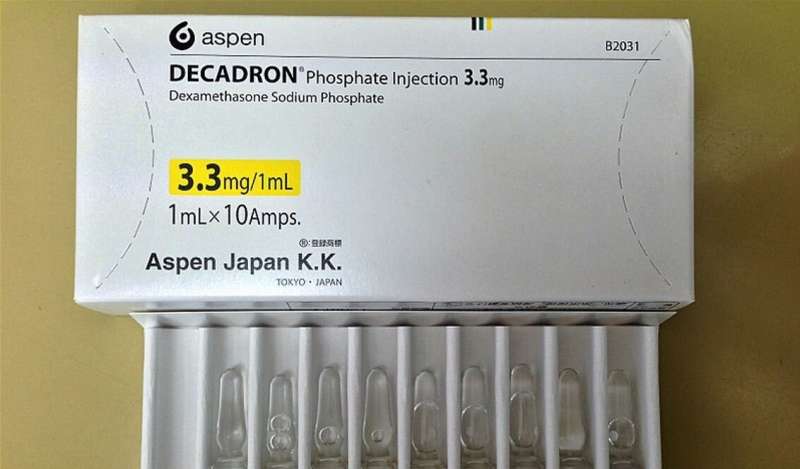

Use of the steroid, dexamethasone, has been confirmed as a reliable and effective treatment for COVID-19, even in patients with diabetes, according to research to be presented at the Society for Endocrinology annual conference in Edinburgh. By the second wave of the pandemic, dexamethasone was routinely being used to treat hospitalized patients following data suggesting that it was reducing ICU admissions and deaths. However, the use of a steroid, such as dexamethasone, is known to increase blood sugar levels, a serious health risk for patients with diabetes. The urgency of the pandemic meant that the medical profession had to mobilize fast to save lives but the downstream risks and effects of the dexamethasone treatment were at the time unknown. This study indicates that despite blood glucose control complications, dexamethasone remains a cheap, life-saving and effective treatment for COVID-19, provided patients are monitored for any related complications.
Although COVID-19 presented as a respiratory infection, patients that needed breathing support and intensive care treatment showed signs of an over active immune system. This sparked debate on whether the use of an immunosuppressing steroid would be a safe therapy. Evidence was needed on effectiveness and safety, so the RECOVERY group quickly mobilized clinical trials that indicated it was beneficial in patients requiring oxygen support, and that it reduced the risk of death. However, dexamethasone is a potent steroid that can induce diabetes, as well as worsen existing diabetes. Patients with diabetes were already identified as having a greater risk of severe COVID-19 and it was unclear whether this treatment may be unsafe for this, and other, at risk patient groups.
Lead investigator, Dr. Victoria Salem, comments, “We really didn’t know how to manage it, we were learning as we went along. The RECOVERY trial showed that if you had COVID severe enough to need hospital treatment with a ventilator, then there was almost a third reduction in deaths for patients given dexamethasone.”
Dr. Salem and colleagues from Imperial College Healthcare NHS Trust hospitals further assessed the benefits of dexamethasone with a focus on outcomes for patients with diabetes, as well as any other complications arising from raised blood sugar. The team compared outcomes for over 800 patients in wave 1 (no dexamethasone) with over 1,300 patients in wave 2 (routine dexamethasone). Dexamethasone significantly reduced the risk of ICU admission and death by 56%, although in patients with diabetes, it was associated with the need for extra medications to maintain blood sugar levels and, in a small minority, serious diabetic complications. However, the independent benefit of dexamethasone at reducing death from COVID was not lessened in patients with diabetes.
Methods
Data from Imperial College Healthcare NHS Trust hospitals were collected from 1372 consecutive patients hospitalized with COVID-19 between 01/11/2020 and 31/01/2021 (Wave 2) and 889 patients admitted between 09/03/2020 to 22/04/2020 (wave 1). The primary outcome was admission to intensive care (ICU) or death within 30 days of COVID-19 diagnosis. Secondary endpoints were post-dexamethasone glycaemic complications. Multivariate logistic regression analyses were performed to determine the factors associated with primary outcome and to determine impact of dexamethasone on the primary outcome.
Results
Mortality alone, without accounting for ICU admission, was significantly lower in wave 2 (wave 27.6%, wave 2 18.8%, 31.8% reduced risk of death, p<0.01). Male gender, hypertension, increased frailty and lower eGFR were independently associated with the primary outcome. Dexamethasone significantly reduced the risk of death/ICU admission by 56%. In patients with diabetes, dexamethasone use is associated with increased risk of glycaemic complications (OR=22.5, 95% CI 13.98-36.67, P<0.0001). However, the risk of death/ICU admission was not increased in those with post-dexamethasone complications.
Conclusions
Dexamethasone reduced the risk of death/ICU admission. There was no difference in ICU admission rates between waves 1 and 2, possibly driven by the dominance of new SARS-Cov2 variants. Patients with diabetes are more likely to develop steroid-induced dysglycaemia, but this did not increase mortality.
The results of this study will be published soon and, with other studies, help to guide future treatment strategies. Further work is needed to identify risk factors and how best to effectively and safely treat patients with different conditions. Patients can be given co-treatments and additional monitoring to avoid and manage steroid-related complications.
Source: Read Full Article